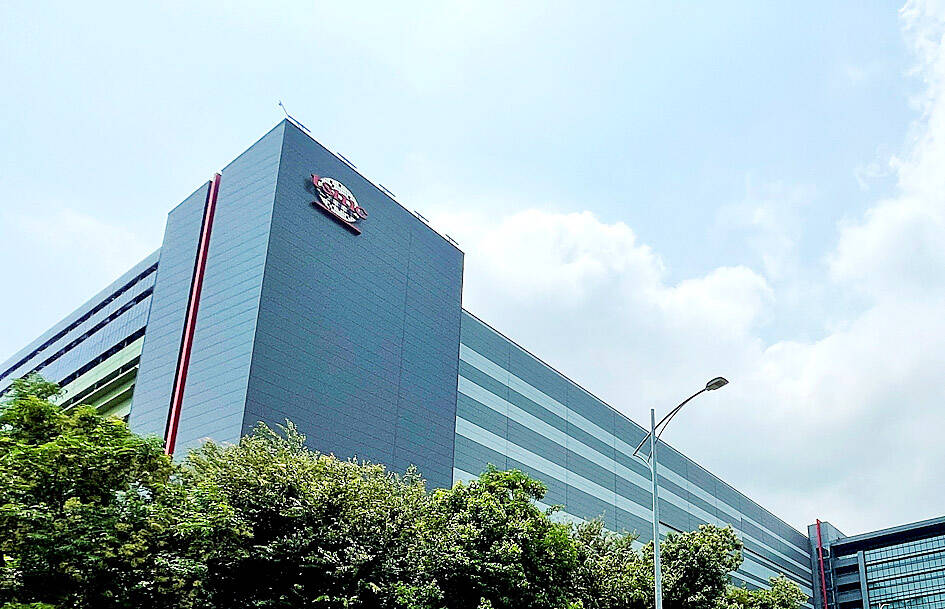Taiwan Semiconductor Manufacturing Co (TSMC, 台積電), the world’s largest contract chipmaker, yesterday said it would not rule out building a 1-nanometer (nm) fab at the Longtan (龍潭) campus of Hsinchu Science Park (新竹科學園區).
“There are multiple factors that we take into consideration in selecting a manufacturing site. The company will continue investing in advanced technologies in Taiwan,” TSMC said in a statement in response to a Taipei Times question about whether it has chosen Longtan District (龍潭) as the site for a 1-nanometer fab.
“The company will not rule out any possibility. It continues to evaluate suitable sites to build semiconductor fabs in Taiwan,” the statement added.

Photo: Yimou Lee, Reuters
TSMC operates an advanced chip packaging facility in Longtan, company data showed.
The production of 1-nanometer chips would still be several years away, as TSMC is in the process of developing 2-nanometer process technology in preparation for volume production in 2025.
The company’s 3-nanometer process will be the most advanced technology when it is introduced later this quarter to manufacture chips for smartphones and high-performance computing devices, TSMC said.
TSMC’s remarks came after Taoyuan Mayor Cheng Wen-tsan (鄭文燦) told reporters that government agencies are stepping up efforts to expand the Longtan campus to satisfy TSMC’s demand as it builds new manufacturing facilities.
The Taoyuan City Government welcomes TSMC’s decision to deepen its investment by building a 1-nanometer chip facility in the city, Cheng wrote on Facebook yesterday.
As the Longtan campus of the science park is fully utilized, government agencies are working together to expand the science park for TSMC, Cheng wrote.
This project has been under discussions for three years and government agencies have for the past two years been more active in pushing for the park’s expansion, including land expropriation and utilities planning, he said.
The Chinese-language Commercial Times was yesterday the first to report that TSMC was considering setting up a 1-nanometer fab in Longtan, citing an unnamed source.
Asked about the report, Hsinchu Science Park Bureau Deputy Director-General Chen Shu-chu (陳淑珠) said she would not comment on the investment plans of an individual company.
However, the bureau would help companies acquire land in the third phase of the Longtan campus’ development, which has yet to get under way, as the first phase is almost full and the second phase will mainly be devoted to green spaces and parks, Chen said.
Additional reporting by CNA

Conflict with Taiwan could leave China with “massive economic disruption, catastrophic military losses, significant social unrest, and devastating sanctions,” a US think tank said in a report released on Monday. The German Marshall Fund released a report titled If China Attacks Taiwan: The Consequences for China of “Minor Conflict” and “Major War” Scenarios. The report details the “massive” economic, military, social and international costs to China in the event of a minor conflict or major war with Taiwan, estimating that the Chinese People’s Liberation Army (PLA) could sustain losses of more than half of its active-duty ground forces, including 100,000 troops. Understanding Chinese

The Ministry of Foreign Affairs (MOFA) yesterday said it is closely monitoring developments in Venezuela, and would continue to cooperate with democratic allies and work together for regional and global security, stability, and prosperity. The remarks came after the US on Saturday launched a series of airstrikes in Venezuela and kidnapped Venezuelan President Nicolas Maduro, who was later flown to New York along with his wife. The pair face US charges related to drug trafficking and alleged cooperation with gangs designated as terrorist organizations. Maduro has denied the allegations. The ministry said that it is closely monitoring the political and economic situation

‘SLICING METHOD’: In the event of a blockade, the China Coast Guard would intercept Taiwanese ships while its navy would seek to deter foreign intervention China’s military drills around Taiwan this week signaled potential strategies to cut the nation off from energy supplies and foreign military assistance, a US think tank report said. The Chinese People’s Liberation Army (PLA) conducted what it called “Justice Mission 2025” exercises from Monday to Tuesday in five maritime zones and airspace around Taiwan, calling them a warning to “Taiwanese independence” forces. In a report released on Wednesday, the Institute for the Study of War said the exercises effectively simulated blocking shipping routes to major port cities, including Kaohsiung, Keelung and Hualien. Taiwan would be highly vulnerable under such a blockade, because it

UNRELENTING: China attempted cyberattacks on Taiwan’s critical infrastructure 2.63 million times per day last year, up from 1.23 million in 2023, the NSB said China’s cyberarmy has long engaged in cyberattacks against Taiwan’s critical infrastructure, employing diverse and evolving tactics, the National Security Bureau (NSB) said yesterday, adding that cyberattacks on critical energy infrastructure last year increased 10-fold compared with the previous year. The NSB yesterday released a report titled Analysis on China’s Cyber Threats to Taiwan’s Critical Infrastructure in 2025, outlining the number of cyberattacks, major tactics and hacker groups. Taiwan’s national intelligence community identified a large number of cybersecurity incidents last year, the bureau said in a statement. China’s cyberarmy last year launched an average of 2.63 million intrusion attempts per day targeting Taiwan’s critical